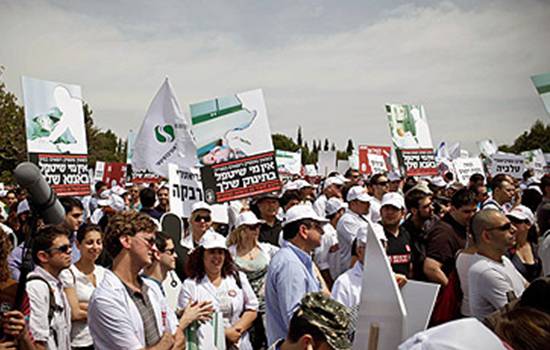
Israeli Medical Association (IMA) declares series of harsher protest moves following failure of its negotiations with Health Ministry, Treasury officials over employment conditions. Doctors are launching a general strike today as part of their ongoing efforts to improve employment conditions, and will not provide nonessential services at public hospitals, or receive patients at Clalit or Leumit health clinics.

In addition, nurses will leave two beds empty in each internal medicine ward as part of their own open-ended sanctions. They are protesting the government’s failure to fill the positions agreed upon in a deal in January, and threaten to toughen sanctions next week if additional nurses are not hired to fill the shortage in internal medicine wards.
“Our protest is on behalf of the patients”, said Ilana Cohen, head of the National Association of Nurses. “There are patients on respirators in Israel who are supposed to be in intensive care, but are tossed into an internal medicine ward without sufficient nursing personnel. That is something that should not be done.”
The doctors renewed sanctions at public hospitals yesterday, conducting only oncological and emergency operations. The strike will affect public and Clalit-run general hospitals as well as psychiatric and geriatric facilities.
Emergency rooms, intensive care, delivery rooms and neonatal wards will continue to operate normally, and urgent dialysis, oncological and in-vitro fertilization treatment will still be provided during the strike. Clalit and Leumit administrative and radiology services will continue to be available. Physical therapy will continue and pharmacies will remain open.
In Jerusalem, Hadassah University Hospital (Ein Karem and Mount Scopus branches ), Shaare Zedek Medical Center and Bikur Holim, which are run by nonprofit associations, are also taking part in the strike.
The Israel Medical Association is preparing to carry out its threat of harsher sanctions beginning in July, including a severe reduction in the number of doctors at certain institutions and in their work hours, in keeping with existing agreements with the government.
Senior health officials said they expect such a move to cause the gradual collapse of the public hospital system, to the point where some departments would have to be shut down or combined with others to cope with the staffing shortage.
Doctors are seeking a total of 1,000 additional spots, effective immediately – among them 173 new physician positions in premature baby wards, 100 for outlying areas and 100 for understaffed specialties.
Yesterday the High Court of Justice rejected a petition the Israel Medical Association filed in January to allocate funding for more positions, in light of the cabinet decision in February to approve 160 more jobs. At the time, the cabinet also approved an additional 960 hospital beds over the next six years.
The High Court said that if the plan approved by the cabinet is not implemented, the court would consider taking action in response to another petition.
Talks between the doctors and the treasury resumed yesterday, and a hearing was held last night at the Tel Aviv regional labor court, in an effort to resolve the crisis.
The court ordered the doctors and the government to discuss how many doctors’ positions will be added in hospitals across the country, especially in outlying areas. The sides were still deliberating late at night, but made no move to cancel today’s strike.
On Wednesday, only urgent and oncological operations will be held in hospitals. In addition, hospital outpatient clinics, diagnostic clinics, and day hospitals in general, psychiatric and geriatric hospitals will shut down.
The Knesset State Control Committee will meet to discuss crowding in internal medicine departments on Wednesday at 9 a.m.
Thursday will see the same schedule of sanctions as will be held on Wednesday.


